Auto Added by WPeMatico
Equity Monday: Jeff’s going to space, and everyone wants a piece of Flipkart
Hello and welcome back to Equity, TechCrunch’s venture capital-focused podcast where we unpack the numbers behind the headlines.
This is Equity Monday, our weekly kickoff that tracks the latest private market news, talks about the coming week, digs into some recent funding rounds and mulls over a larger theme or narrative from the private markets. You can follow the show on Twitter here and myself here.
It’s WWDC week, so expect a deluge of Apple news to overtake your Twitter feed here and there over the next few days. But there’s a lot more going on, so let’s dig in:
- The Weekend: A supercharged, supercharged Model S Tesla car is not coming out. Instead, a merely supercharged version will come out. It’s still stupid fast and expensive. And Nigeria’s war with Twitter continued, with new efforts from the African nation to limit access to the social media service within its borders.
- This Morning: Flipkart is raising $3 billion at a roughly $40 billion valuation. The deal underscores not just how big the Indian tech scene is, but also how much investor interest there is in e-commerce bets more generally. And Jeff Bezos is going to space. Soon!
- Funding Rounds: Trulioo raised a $394 million Series D. The Canadian startup is now worth far more than $1 billion. And Chinese company Kanzhun is going public in the United States, which raised an eyebrow here amongst the Equity Morning Crew.
- Take The Damn Equity Survey: Take it! All the cools kids are taking it!
And that’s your start to the week. More to come from your friends here on Wednesday, and Friday. Chat soon!
Equity drops every Monday at 7:00 a.m. PST, Wednesday, and Friday at 6:00 AM PST, so subscribe to us on Apple Podcasts, Overcast, Spotify and all the casts!
Powered by WPeMatico
This Week in Apps: WWDC Prep, F8 recap, TikTok goes after biometric data
Welcome back to This Week in Apps, the weekly TechCrunch series that recaps the latest in mobile OS news, mobile applications and the overall app economy.
The app industry continues to grow, with a record 218 billion downloads and $143 billion in global consumer spend in 2020. Consumers last year also spent 3.5 trillion minutes using apps on Android devices alone. And in the U.S., app usage surged ahead of the time spent watching live TV. Currently, the average American watches 3.7 hours of live TV per day, but now spends four hours per day on their mobile devices.
Apps aren’t just a way to pass idle hours — they’re also a big business. In 2019, mobile-first companies had a combined $544 billion valuation, 6.5x higher than those without a mobile focus. In 2020, investors poured $73 billion in capital into mobile companies — a figure that’s up 27% year-over-year.
This week was a busy one. Facebook held its developer conference F8 which delivered a lot of app-related news across its platform. Now, WWDC is just days away. We also broke a few big app stories this week, including one about TikTok’s privacy policy and its newly added permission to collect biometric data on U.S. users, including “faceprints and voiceprints.” Twitter added a subscription service, and Tinder tested group video chat.
And in our downloads section, we have a treat for readers: a time-sensitive and exclusive invite code to get into one of the hottest new apps for sneakerheads: Sole Retriever.
Get the This Week in Apps newsletter! Sign up here: techcrunch.com/newsletters
WWDC 21 Prep
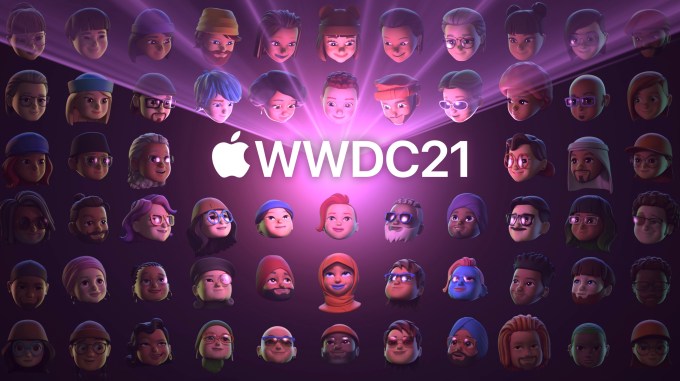
Image Credits: Apple
WWDC’s big keynote is kicking off next week on June 7 at 1 PM ET. The livestream page is here. While we may see new MacBook Pros, what software developers will care about are the forthcoming details about Apple’s latest OS releases and other new technologies. As to what they may include? Bloomberg reported that iOS 15 will introduce a way for users to set different notification preferences and automatic replies, based on their current status (driving, working, sleeping, etc.) and an updated Lock Screen where this menu of choices would be accessible. iMessage may be upgraded to be more social, to better compete with Messenger and WhatsApp. Meanwhile, iPadOS could be getting the App Library and an upgraded Home Screen with support for widgets. (And you can fill the screen with just widgets, if you choose.) Or who knows! Until it’s official, it’s all a maybe!
But one potentially interesting rumor to watch for would be a new privacy feature that would show users which apps were collecting data about them. This builds on Apple’s investments in App Tracking Transparency and could make it more difficult for shady SDKs to stay in business.
There will likely be some updates coming to other Apple’s own apps, Siri, watchOS and more. It’s going to be a packed week — stay tuned!
Ahead of WWDC, Apple also updated its report (conducted on its behalf via the Analysis Group) on App Store commerce. The company says the App Store facilitated $643 billion in billings and sales in 2020, up 24% from the $519 billion seen the year prior. It also noted that about 90% of the billings and sales facilitated by the App Store actually took place outside its walls, meaning Apple took no commission on those purchases. This is up from the 85% figure reported last year. The full report delves into other trends related to the pandemic’s impact, small and large businesses, and more. Apple initially commissioned the report to demonstrate how little business on the App Store is actually subject to App Store fees, but now it’s updated the report a year later. It’s interesting how much understanding Apple has about its App Store, especially when Tim Cook claimed to know so little about several crucial figures.
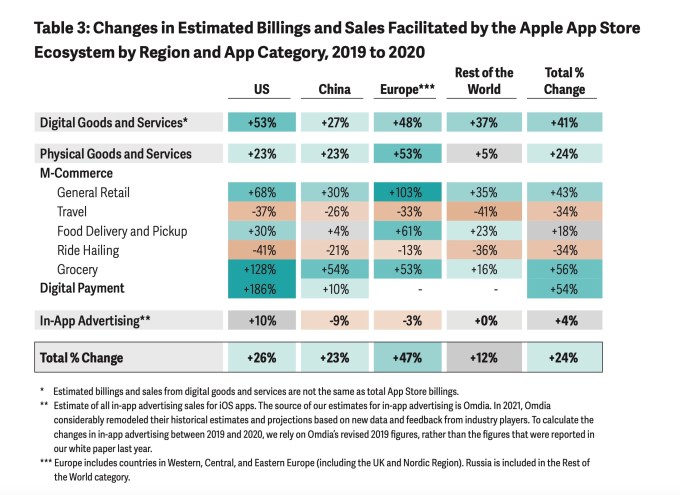
Image Credits: Apple
Apple also this week unveiled its 2021 Apple Design finalists. The awards honor apps and games that offer a combination of innovation, ingenuity and technical achievement — the latter which often means making great use of Apple technologies. The finalists span six categories: Inclusivity, Delight and Fun, Interaction, Social Impact, Visuals and Graphics, and Innovation.
Among the prospective winners are apps including snarky weather app Carrot Weather as well as the unique (Not Boring) Weather, short-form news service Brief, mental wellness app and Google Play award winner Loona, Editor’s Choice Genshin Impact, Snowman’s new kids app Pok Pok Playroom and summertime fun music app Poolside FM, and many others.
Weekly News
Platforms: Google
Google this week opened submissions for two of its annual developer programs: the Indie Games Accelerator and the Indie Games Festival. The programs are designed to help small games studios grow on Google Play. This year, the programs will include more eligible markets and will be fully digital experiences.
Google will restrict third-party apps from customizing the native Android Sharesheet in Android 12. Currently, the UI of the Sharesheet can differ from app to app, but XDA Developers reports it will become more iOS-like, by offering a consistent menu across apps.
Google is taking a cue from Apple by allowing users to opt out of personalization using the advertising ID in the Android Settings. Once users opt out, the advertising ID is disabled. The ID is a unique, user-resettable identifier provided by Google Play services. As part of a coming Google Play services update in late 2021, the advertising identifier will be removed when the user opts out of tracking, and any attempt to access the identifier will only return a string of zeros. Google says ad and analytics service partners will receive notifications about a user’s preferences to help them with compliance. The change will roll out in late 2021 and will impact apps running on Android 12 devices initially, with an expansion to devices that support Google Play in early 2022.
Platforms: Huawei (!!)

Image Credits: Wang Chenglu, president of Huawei Consumer Business Group’s software department
Two years after Huawei was put on a list of Chinese companies banned from doing business with U.S. organizations, it launched its proprietary operating system, HarmonyOS, for smartphones. The OS is designed to power phones, tablets and smart devices. Smartphone maker Meizu has already hinted it may adopt the new OS.
Augmented Reality

Image Credits: Facebook
Facebook’s flagship AR creation software, Spark AR, has already been used by more than 600,000 creators from over 190 countries to publish over 2 million AR effects. At Facebook’s F8 event this week, the company announced Multipeer API for video calls on Messenger, Instagram and Portal. The API will allow developers to create “shared AR” effects that apply to all the call participants — like a party hat that shows up on everyone’s heads for a birthday call, for instance.
E-commerce/Retail
Convenience store-style on-demand delivery startup JOKR launched in New York City to provide 15-minute or less delivery of items you might otherwise find in small stores and local delis. Except instead of dealing with stores, JOKR has its own strategically placed micro-hubs. The startup was founded by Ralf Wenzel, who previously founded Foodpanda, which later merged with Delivery Hero.

Image Credits: Walmart
Walmart is handing out over 740,000 new Samsung Galaxy XCover Pro smartphones (retail $499) to its employees, saying that “constant communication” is essential to its business. The phones will run Walmart’s proprietary Me@Walmart app, where employees clock in, adjust schedules, use the voice assistant “Ask Sam,” and communicate with others via push-to-talk. Employees will be allowed to use the phone for personal use after work hours, and Walmart will not have access to their personal data, the retailer says.
Fintech
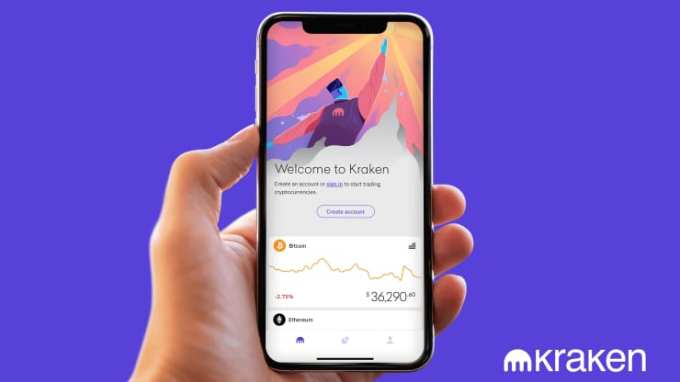
Image Credits: Kraken
Coinbase rival Kraken launched a mobile app in the U.S. that allows users to buy and sell more than 50 crypto tokens from their mobile phone. Kraken is the world’s fourth-largest digital currency exchange, in terms of trading volume.
Venmo now lets users hide their friend list for additional privacy. The change to the app came after BuzzFeed News found President Biden’s Venmo account using public friend lists. Digital rights groups had called the design a “security nightmare.”
Japan-based Line Corp. is launching its digital banking platform in Indonesia, which means it will now offering banking services in three of its biggest overseas markets: Indonesia, Thailand and Taiwan.
Coinbase Card, which allows users to spend their crypto while on the go, now works with Apple Pay and Google Pay. The card will offer up to 4% in crypto rewards for everyday purchases.
Chime has established itself as the No. 1 neobank in the U.S., according to eMarketer. The banking app will have 13.1 million U.S. accounts this year, up 30.7% from 2020. Current will have 4 million, double from the 2.1 million it had last year. Aspiration is in third place, with 3 million, followed by Varo, at 2.7 million.
Social
 Scoop: Tinder tested a group video chat feature ahead of parent company Match’s move into social discovery with its $1.73 billion acquisition of Seoul-based Hyperconnect. The feature was only tested briefly in New Zealand and then shut down, but may have served as a way to gain valuable data about younger users’ interest in social discovery apps and services as Match moves into that market which it says is double the size of the dating market.
Scoop: Tinder tested a group video chat feature ahead of parent company Match’s move into social discovery with its $1.73 billion acquisition of Seoul-based Hyperconnect. The feature was only tested briefly in New Zealand and then shut down, but may have served as a way to gain valuable data about younger users’ interest in social discovery apps and services as Match moves into that market which it says is double the size of the dating market.
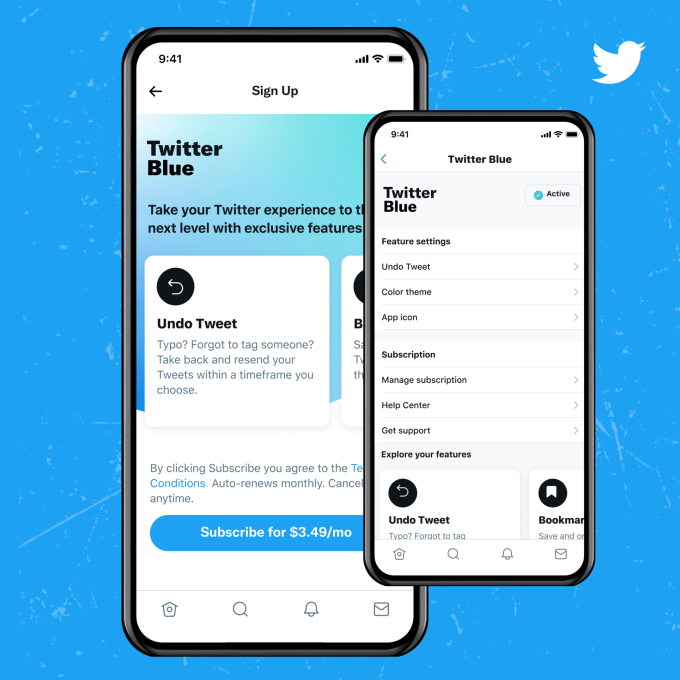
Image Credits: Twitter
Twitter Blue officially launched. Will you pay for better Twitter? Twitter’s new premium subscription brings tools to organize your bookmarks, read threads in a clutter-free format and take advantage of an “Undo Tweet” feature — which is the closest thing Twitter will have to the long-requested “Edit” button. It also offers a few other perks, like custom app icons, colorful themes and subscription customer support. Unfortunately, the service is only live in Canada and Australia for the time being.
Twitter redesigned its mobile app to put its Clubhouse rival, Twitter Spaces, in the middle of its navigation bar. Initially, only around 500 people from the original Spaces beta test will first see the new Spaces discovery tab, but it will expand to more people over time. The tab will help people keep track of Spaces they want to listen to and manage notifications, among other things.
Twitter began rolling out Birdwatch fact checks inside tweets. Birdwatch is Twitter’s pilot program that aims to crowdsource fact-checking of tweets, as an alternative to relying on fact-checkers. The program’s goal will be to append more info to misinformation online in real time.
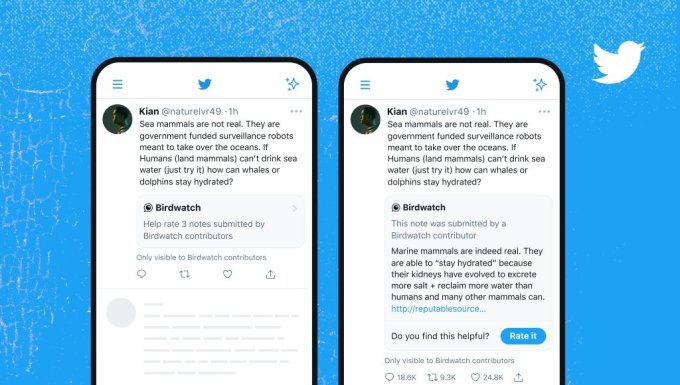
TikTok reamined the top non-game app worldwide in May 2021 by downloads. According to Sensor Tower, TikTok was No. 1 on both the App Store and Google Play with 80 million combined installs. Brazil accounted for 16% of those, and China 12%.
Facebook at its developer conference F8 also introduced Facebook Login Connect with Messenger. For businesses that have already integrated with Facebook Login, this allow users to log in to their app using their Facebook credentials and opt in to chat with businesses over Messenger, all in the Facebook Login flow. The tool is in closed beta.
Facebook also updated its Business Suite with a new feature that will allow developers to build “business apps,” which are tools made by third-party developers that work alongside the Business Suite. These “apps” could do things like bring in content from a catalog to their Facebook page or Instagram account. The platform already has 30 developers working on it and integrates with e-commerce platforms, like BigCommerce.
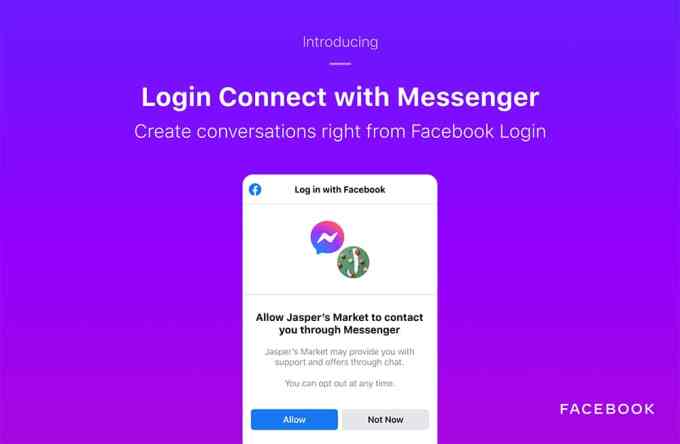
Image Credits: Facebook
Messaging
WhatsApp reversed course and now says it won’t reduce the app’s functionality if users don’t agree to its new privacy policy. The rollout had led to a lot of backlash as it revealed the messaging app would begin sharing more info with Facebook.
As part of its F8-related announcements, WhatsApp said it would update its Business API to make it quicker for business to get started with its service. WhatsApp will make it faster to set up a business account (5 minutes instead of weeks), and will allow businesses to respond faster to inbound messages, as well as send messages to users who opted in. The business tool for customer care will allow up to 10 pre-written messages, among other updates.
Facebook CEO Mark Zuckerberg told popular news outlet/leaker WaBetaInfo that WhatsApp will add multi-device support for connecting up to four devices to one account. He also said WhatsApp will introduce a “view once” disappearing feature for photos and videos, and is working on an iPad app. The method of delivering this news is worth noting — WaBetaInfo is not a traditional news outlet, but more of an independent news portal of sorts. Zuckerberg has been taking Facebook news to non-traditional (and often far friendlier) channels as of late, including popping up in Clubhouse rooms and other independent outlets. Facebook clearly feels mainstream press has turned on it when they…[checks notes]…held Facebook accountable for its actions.
Facebook also announced the general availability of the Messenger API for Instagram. First announced last fall and rolling out in phases, the API offers a more efficient way for larger brands to handle a high volume of messages by allowing them to integrate Instagram messaging into the tools and applications they’re already using in-house to manage their Facebook conversations.
Community social network Nextdoor launched a new feature called Free Finds that helps its users unload their unwanted stuff on others in their neighborhood. Notably, the feature doesn’t require you to be a Nextdoor member to access the listings, but eventually, those users may convert.
Streaming & Entertainment
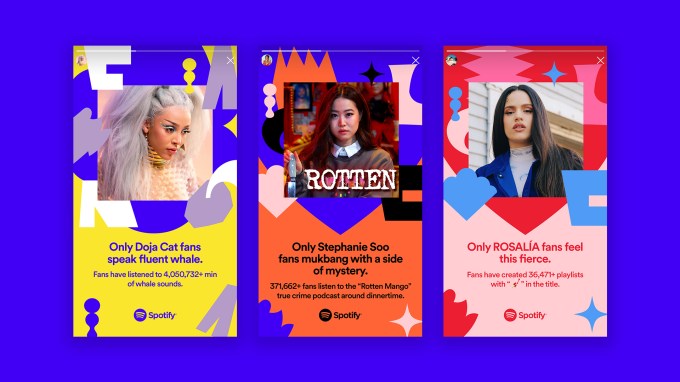
Image Credits: Spotify
Spotify rolled out a sort of mid-year version of Wrapped with the launch of the new personalized experience, Only You. The feature offers insights about your music history in a sharable format, like your musical dinner party or audio birth chart, and other fun finds. Why now? Perhaps Spotify is heading off Apple Music news to come with a feature that reminds users it does personalization best?
Spotify also added Blend, a way to create a playlist with any other Spotify user. The company offers a similar feature for users on its Family and Duo plans, but this new tool doesn’t require users to be in the same household.
Apple tried to acquire livestreaming music platform Verzuz, which later sold to video social network Triller, Bloomberg reported. Apple didn’t engage in a bidding war and offered a lower price than what Triller paid, it said.
The Apple TV app launched on Android devices. Like Apple Music, Apple TV is a service that needs to work across platforms in order to compete with rivals. The Android app’s arrival followed the Apple TV app’s debut on Nvidia’s Shield TV, which means it’s now available across all major Android TV-based devices.
Health & Fitness
Amazon updated its Halo health app with a new feature called Movement Health, which will use computer vision and machine learning to asses users’ posture, mobility and stability and then suggest exercises to improve them.
Peloton slashed the pricing for its fitness app, normally $12.99/mo, for students, teachers, healthcare workers and military. Students can pay $6.99/mo while the others can pay $9.99/mo. Military members and their families can lock in that rate for life. The company is facing a PR crisis after recalling treadmills that injured 70 and led to one infant death.
Utilities
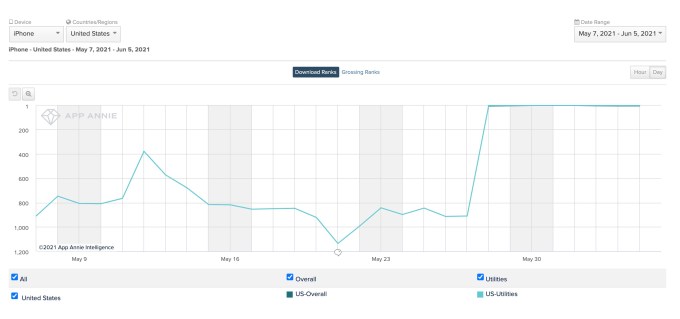
Image Credits: App Annie
A TikTok trend where users prank people by spamming them on text has driven the app that makes that possible, Paste Keyboard, to the top of the App Store. Mashable noted the app’s rise, but couldn’t figure out why. Nor could App Annie. It’s kids, y’all. Honestly, the App Store needs a new “viral” chart at this point.
AirTag support is coming to Android. Apple announced some changes to AirTag, including the period of time they’ll make a sound when moved. The time will change from three times per day to a random time between 8-24 hours. Apple believes the shortening of the window will serve as a better deterrent against bad actors using AirTag to track someone. Alongside this announcement, Apple said it will later this year launch an Android application that will allow users to detect AirTag or other Find My network-enabled accessories that are separated from its owner and may be traveling with a user.
Firefox revamped its Mac and iOS app this week with a what it claims is a more distraction-free design, featuring streamlined toolbar and menus, expanded privacy protections, a new look for tabs, updated notifications and alerts, easier muting, and more.
Ring added “Request for Assistance posts” on its Neighbors app, claiming this will allow public safety agencies (e.g. police) to ask communities for help in investigations. The Request for Assistance posts can only be issued from verified public safety agency profiles, Ring says. Of course, this isn’t the only way police can acquire Ring videos, as the company has many police partnerships across the U.S. that let them acquire footage without a warrant.
Auto/Transportation
Toyota added a data privacy portal to its apps. The feature is available in the Account Settings of the Toyota and Lexus apps and works with vehicles offering connected services that were built in the 2013 model year or later. It also allows consumers who own multiple Toyota or Lexus vehicles to customize privacy and data-sharing settings for each.
Gokada is launching its ride-hailing service in two more Nigerian cities as part of its super app plans. The company is merging its ride-hailing service with food delivery platform GShop. In the past year, Gokada crossed $100 million in annualized transaction value, and helped onboard 30,000 merchants.
Reading
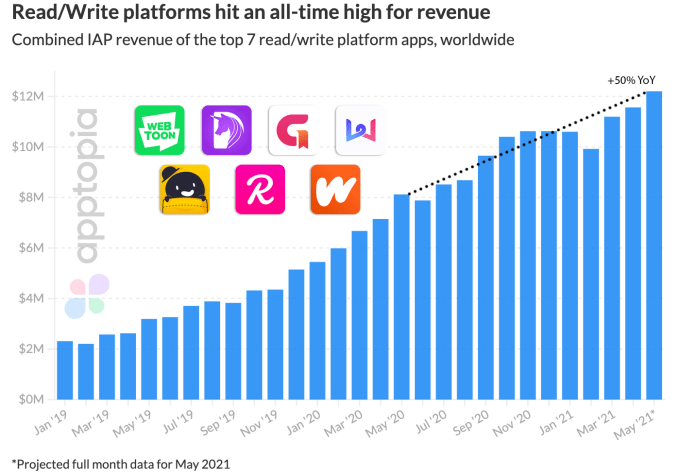
Image Credits: Apptopia
The top reading and writing apps grew their IAP revenue 50% YoY in May 2021, Apptopia reported. This group includes apps for writing novels or comic books, or reading the works from others, like Webtoon, Wattpad, Dreame, GoodNovel, Webnovel, Tapas and Radish. As a grouping, these apps have also grown IAP revenue 15% over the past six months. Since January 2020, Webtoon and Dreame combined accounted for 56.3% of the grouping’s total IAP revenue.
Government & Policy
Google, Facebook, WhatsApp, Telegram, LinkedIn and startups ShareChat and Koo have now either fully or partially complied with India’s IT rules that require them to appoint and share contact details of representatives tasked with compliance, nodal point of reference and grievance redressals to address on-ground concerns. Twitter, whose offices were raided by police in Delhi, has not yet complied.
EU will review TikTok’s Terms of Service following child safety complaints. Areas of concern include hidden marketing, aggressive advertising techniques targeted at children and contractual terms in the company’s policies that could be misleading or confusing for consumers.
Security & Privacy
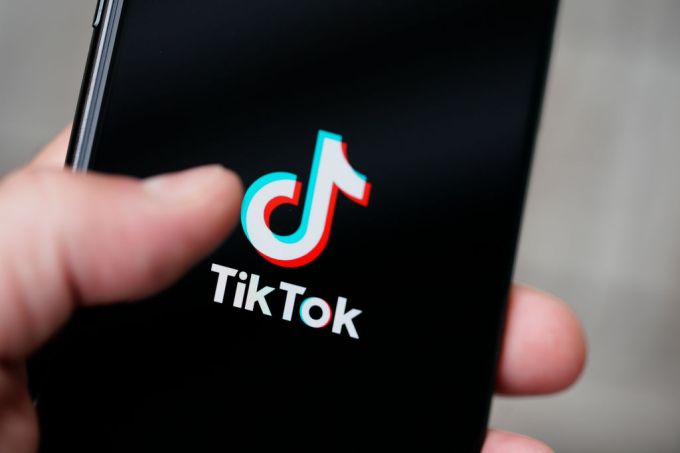
The TikTok logo is seen on an iPhone 11 Pro max
 Scoop: TikTok just gave itself permission to collect biometric data on U.S. users, including “faceprints and voiceprints.” A change to TikTok’s U.S. privacy policy on Wednesday introduced a new section that says the social video app “may collect biometric identifiers and biometric information” from its users’ content, including things like “faceprints and voiceprints.” Reached for comment, TikTok could not confirm what product developments necessitated the addition of biometric data to its list of disclosures about the information it automatically collects from users, but said it would ask for consent in the case such data collection practices began.
Scoop: TikTok just gave itself permission to collect biometric data on U.S. users, including “faceprints and voiceprints.” A change to TikTok’s U.S. privacy policy on Wednesday introduced a new section that says the social video app “may collect biometric identifiers and biometric information” from its users’ content, including things like “faceprints and voiceprints.” Reached for comment, TikTok could not confirm what product developments necessitated the addition of biometric data to its list of disclosures about the information it automatically collects from users, but said it would ask for consent in the case such data collection practices began.
The biometric data collection details were introduced in the newly added section, “Image and Audio Information,” found under the heading of “Information we collect automatically” in the policy.
Alibaba’s UC Browser app has been found to be harvesting the private web activity of users across Android or iOS when incognito mode is turned on. The browser is the fourth largest in the world, with 500 million Android downloads alone. Before being banned in India over security concerns related to Chinese apps, it was also one of the most popular in India, as well.
Funding and M&A
 Miami-based NUE Life Health raised $3.3 million for its telemedicine platform and app in the U.S., where it combines mental wellness solutions that employ psychedelic-assisted therapies with a graph database-driven app. The app was backed by investors who recently left SV for Miami, including Jack Abraham, Shervin Pishevar, Martin Varsavsky, Jon Oringer, James Bailey and Christina Getty.
Miami-based NUE Life Health raised $3.3 million for its telemedicine platform and app in the U.S., where it combines mental wellness solutions that employ psychedelic-assisted therapies with a graph database-driven app. The app was backed by investors who recently left SV for Miami, including Jack Abraham, Shervin Pishevar, Martin Varsavsky, Jon Oringer, James Bailey and Christina Getty.
 Etsy acquired secondhand e-commerce startup Depop for more than $1.6 billion. Depop, which caters to a Gen Z crowd, saw 2020 gross merchandise sales and revenue of approximately $650 million and $70 million, respectively.
Etsy acquired secondhand e-commerce startup Depop for more than $1.6 billion. Depop, which caters to a Gen Z crowd, saw 2020 gross merchandise sales and revenue of approximately $650 million and $70 million, respectively.
 Social network platform Venn raised $60 million in Series B funding led by Group 11. The startup provides technology that allows building owners and other real estate partners and communities to provide social networking services to their tenants, with tools for organizing buy/sell groups, organizing community activities, connecting with neighbors and more.
Social network platform Venn raised $60 million in Series B funding led by Group 11. The startup provides technology that allows building owners and other real estate partners and communities to provide social networking services to their tenants, with tools for organizing buy/sell groups, organizing community activities, connecting with neighbors and more.
 Digital health management company Hello Heart raised $45 million Series C led by IVP. The company’s app is marketed by employers as part of their benefit programs and helps patients manage heart health and blood pressure, medications and more.
Digital health management company Hello Heart raised $45 million Series C led by IVP. The company’s app is marketed by employers as part of their benefit programs and helps patients manage heart health and blood pressure, medications and more.
 Personal finance app Truebill raised $17 million in Series C funding led by Accel, valuing the business at $500 million. The app helps consumers get better control over their finances by helping them cancel subscriptions, negotiate bills, view credit reports, budget, and access spending insights, among other things.
Personal finance app Truebill raised $17 million in Series C funding led by Accel, valuing the business at $500 million. The app helps consumers get better control over their finances by helping them cancel subscriptions, negotiate bills, view credit reports, budget, and access spending insights, among other things.
 Newly launched stock trading app Lightyear disclosed it raised $1.5 million pre-seed funding in a round co-led by the new unnamed fund formed by Wise co-founder Taavet Hinrikus and Teleport co-founder Sten Tamkivi. The app was the fund’s first investment.
Newly launched stock trading app Lightyear disclosed it raised $1.5 million pre-seed funding in a round co-led by the new unnamed fund formed by Wise co-founder Taavet Hinrikus and Teleport co-founder Sten Tamkivi. The app was the fund’s first investment.
 Istanbul-based grocery delivery app Getir raised $550 million in new funding, tripling its valuation to $7.5 billion. New investors include DisruptAD and Mubadala Funding Firm (both being arms of Abu Dhabi sovereign wealth funds) as well as Silicon Valley-based Silver Lake.
Istanbul-based grocery delivery app Getir raised $550 million in new funding, tripling its valuation to $7.5 billion. New investors include DisruptAD and Mubadala Funding Firm (both being arms of Abu Dhabi sovereign wealth funds) as well as Silicon Valley-based Silver Lake.
Downloads
Sole Retriever
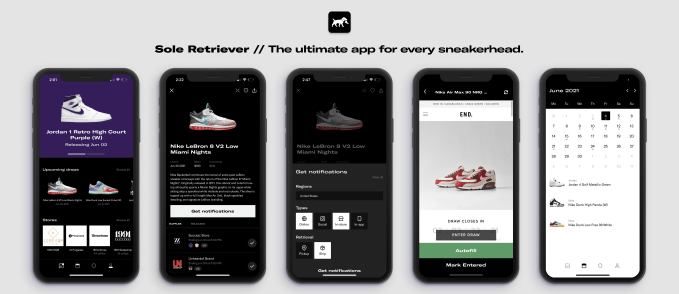
Image Credits: Sole Retriever
Sole Retriever is a newly launched app that aims to be a sneakerhead’s dream.
The app offers a one-stop shop for all things sneaker — including sneaker news, sneaker releases, sneaker raffles, a calendar of upcoming drops and more. The company says its goal is to democratize access to sneaker drops by making this info more accessible and convenient for consumers. Before its mobile launch, Sole Retriever had offered its service via the web only. Now it’s live on both iOS and Android.
Unique to the mobile experience is the ability to customize your alerts so you only hear about the raffles you want to know about — like those in the U.S., or only those that are in-store or online, for example. It also makes entering raffles easier with autofill features. Custom profiles that let you save the info for others who have agreed to let you enter their name and address to increase your chances of winning. And the app can save your logins for different retailers to make shopping easier.
Sole Retriever is currently only available as a waitlist, but TechCrunch readers can bypass the waitlist! Here’s how!
After downloading the app and logging in, when you reach the waitlist screen, you can redeem a special code — “TWIA” (in all caps!), which lets you bypass the entire waitlist and gain instant access to start your seven-day free trial for the app. The code is only valid for 24 hours after this post goes live so hit it quickly!
Apple Developer app
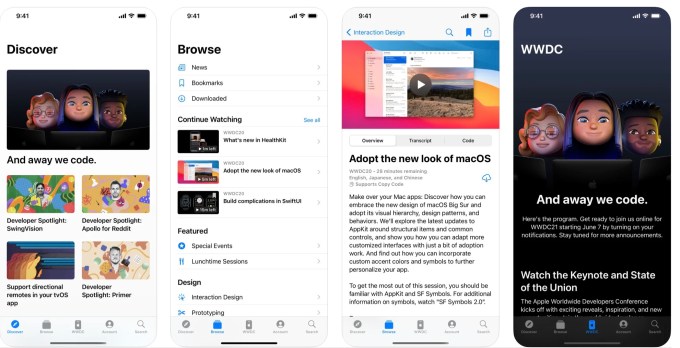
Image Credits: Apple
The Apple Developer app is not new. But it is the must-have download for the week ahead, as it will provide mobile developers with access to everything needed to navigate WWDC 21’s all-digital event. The app was updated this week with details about the agenda, sessions, pavilions, labs, coding and design challenges, and more. Developers can also sign up for labs inside the app and get notifications about their appointments. There are also new WWDC 21 iMessage stickers for some added fun.
Reading Recommendations
- Marco.org: Developer Relations. Marco Arment has some harsh words for Apple ahead of WWDC. He accuses the iPhone maker of undervaluing what apps mean for iOS beyond their IAP revenue. And he points out that developers themselves bring in a good number of customers through their own marketing efforts, not because of their App Store listing.
- Pew Research: Mobile Technology and Home Broadband 2021. Pew takes a look at U.S. trends, including smartphone ownership adoption. Eighty-five percent of U.S. adults now own a smartphone, which is more than have broadband (77%) at home.
- Donny Wals: The iOS Developer’s Guide to WWDC 2021. Wals reminds developers to not get caught up in the WWDC chaos, pace themselves and focus on what matters to their business. He also makes suggestions about what to not overlook during WWDC week.
Tweets
Powered by WPeMatico
Twitter acquires distraction-free reading service Scroll to beef up its subscription product
Twitter this morning announced it’s acquiring Scroll, a subscription service that offers readers a better way to read through long-form content on the web, by removing ads and other website clutter that can slow down the experience. The service will become a part of Twitter’s larger plans to invest in subscriptions, the company says, and will later be offered as one of the premium features Twitter will provide to subscribers.
Premium subscribers will be able to use Scroll to easily read their articles from news outlets and from Twitter’s own newsletters product, Revue, another recent acquisition that’s already been integrated into Twitter’s service. When subscribers use Scroll through Twitter, a portion of their subscription revenue will go to support the publishers and the writers creating the content, explains Twitter in an announcement.
Scroll’s service today works across hundreds of sites, including The Atlantic, The Verge, USA Today, The Sacramento Bee, The Philadelphia Inquirer and The Daily Beast, among others. For readers, the experience of using Scroll is similar to that of a “reader view” — ads, trackers and other website junk is stripped so readers can focus on the content.

Image Credits: Twitter
Scroll’s pitch to publishers has been that it can end up delivering cleaner content that can make them more money than advertising alone.
Deal terms were not disclosed, but Twitter will be bringing on the entire Scroll team, totaling 13 people.
For the time being, Scroll will pause new customer sign-ups so it can focus on integrating its product into Twitter’s subscriptions work and prepare for the expected growth. It will, however, continue to onboard new publishers who want to participate in Scroll’s network, following the deal’s closure.
And Scroll itself will be headed back into private beta as the team works to integrate the product into Twitter.
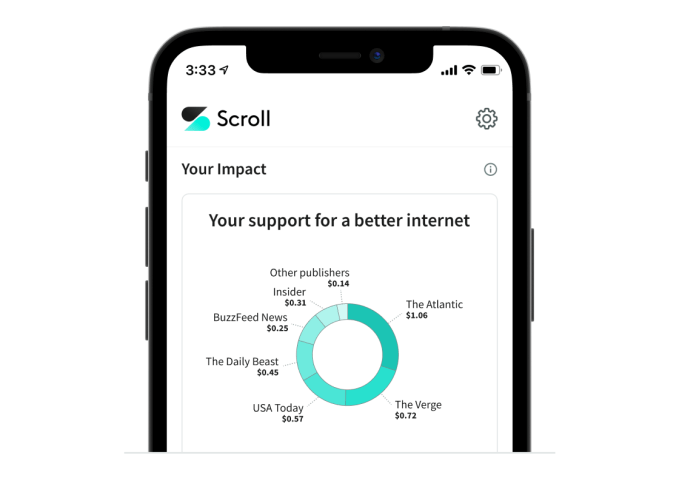
Image Credits: Twitter
Twitter says it will also be winding down Scroll’s news aggregator product, Nuzzel, but will work to bring some of Nuzzel’s core elements to Twitter over time. Nuzzel’s blog post has more details, explaining that the product will need to be rebuilt in order to scale with Twitter.
“Twitter exists to serve the public conversation. Journalism is the mitochondria of that conversation. It initiates, energizes and informs. It converts and confounds perspectives. At its best it helps us stand in one another’s shoes and understand each other’s common humanity,” said Tony Haile, Scroll CEO, in the company’s post about Scroll’s acquisition.
“The mission we’ve been given by Jack and the Twitter team is simple: take the model and platform that Scroll has built and scale it so that everyone who uses Twitter has the opportunity to experience an internet without friction and frustration, a great gathering of people who love the news and pay to sustainably support it,” he added.
Twitter earlier this year detailed its plans to head into subscriptions as a way to diversify beyond ad revenue for its own business. The company unveiled what it’s calling “Super Follow,” a creator-focused subscription that would give paid subscribers access to an expanded array of perks, like exclusive content, subscriber-only newsletters, deals, badges, paywalled media and more. The company is aiming to use this new product to help it achieve its goal of doubling company revenue from $3.7 billion in 2020 to $7.5 billion or more in 2023, it said.
Powered by WPeMatico
Twitter said to have held acquisition talks with Clubhouse on potential $4B deal
Twitter held talks with Clubhouse around a potential acquisition of the live drop-in audio networking platform, with a deal value somewhere around $4 billion, according to a report from Bloomberg. TechCrunch has also confirmed the discussions took place from a source familiar with the conversations.
While the talks occurred over the past several months, they’re no longer taking place, though the reason they ended isn’t known according to the report. It’s also worth noting that just a few days ago, Bloomberg reported that Clubhouse was seeking to raise a new round of funding at a valuation of around $4 billion, but the report detailing the potential acquisition talks indicate that the discussions with Twitter collapsed first, leading to a change in strategy to pursue securing additional capital in exchange for equity investment.
Twitter has its own product very similar to Clubhouse — Spaces, a drop-in audio chatroom feature that it has been rolling out gradually to its user base over the past few months. Clubhouse, meanwhile, just launched the first of its monetization efforts, Clubhouse Payments, which lets users send direct payments to other creators on the platform, provided that person has enabled receipt of said payments.
Interestingly, the monetization effort from Clubhouse actually doesn’t provide them with any money; instead, it’s monetization for recipient users who get 100% of the funds directed their way, minus a small cut for processing that goes directly to Stripe, the payment provider Clubhouse is using to enable the virtual tips.
While we aren’t privy to the specifics of these talks between Twitter and Clubhouse, it does seem like an awfully high price tag for the social network to pay for the audio app, especially given its own progress with Spaces. Clubhouse’s early traction has been undeniable, but there are a lot of questions still remaining about its longevity, and it’s also being cloned left and right by other platforms, begging the age-old startup question of whether it’s a feature or a product on its own.
Whatever went down, the timing of this revelation seems likely to prime the pump for Clubhouse’s conversation with potential investors at its target valuation for the round it’s looking to raise. Regardless, it’s exciting to have this kind of activity, buzz and attention paid to a consumer software play after many years of what one could argue has been a relatively lackluster period for the category.
Powered by WPeMatico
CD Projekt hit by ransomware attack, refuses to pay ransom
Polish video game maker CD Projekt, which makes Cyberpunk 2077 and The Witcher, has confirmed it was hit by a ransomware attack.
In a statement posted to its Twitter account, the company said it will “not give in nor negotiate” with the hackers, saying it has backups in place. “We have already secured our IT infrastructure and begun restoring data,” the company said.
According to the ransom note, the hackers said they would release the company’s stolen source code and other internal files if it did not pay the ransom, since the company would “most likely recover from backups.”
But the company said for now that no personal data was taken. “We are still investigating the incident, however at this time we can confirm that — to our best knowledge — the compromised systems did not contain any personal data of our players or users of our services.”
It’s an increasingly hostile tactic used by ransomware actors: Hackers target high-value businesses and companies with file-encrypting malware and hold the files for a ransom. But since many companies have backups, some ransomware groups threaten to publish the stolen files unless the ransom is paid.
CD Projekt Red did not immediately respond to TechCrunch’s questions, including what kind of ransomware was used to attack its systems.
It’s thought to be the second time in recent years that the company has been hit by ransomware. The game maker confirmed in 2017 that a hack resulted in the compromising of early work related to the Cyberpunk 2077. Weeks following the game’s launch Sony and Microsoft offered gamers refunds, citing bugs and poor performance on older consoles.
Powered by WPeMatico
This Week in Apps: TikTok viral hit breaks Spotify records, inauguration boosts news app installs, judge rules against Parler
Welcome back to This Week in Apps, the weekly TechCrunch series that recaps the latest in mobile OS news, mobile applications and the overall app economy.
The app industry is as hot as ever, with a record 218 billion downloads and $143 billion in global consumer spend in 2020.
Consumers last year also spent 3.5 trillion minutes using apps on Android devices alone. And in the U.S., app usage surged ahead of the time spent watching live TV. Currently, the average American watches 3.7 hours of live TV per day, but now spends four hours per day on their mobile devices.
Apps aren’t just a way to pass idle hours — they’re also a big business. In 2019, mobile-first companies had a combined $544 billion valuation, 6.5x higher than those without a mobile focus. In 2020, investors poured $73 billion in capital into mobile companies — a figure that’s up 27% year-over-year.
This week, we’re looking into how President Biden’s inauguration impacted news apps, the latest in the Parler lawsuit, and how TikTok’s app continues to shape culture, among other things.
Top Stories
Judge says Amazon doesn’t have to host Parler on AWS
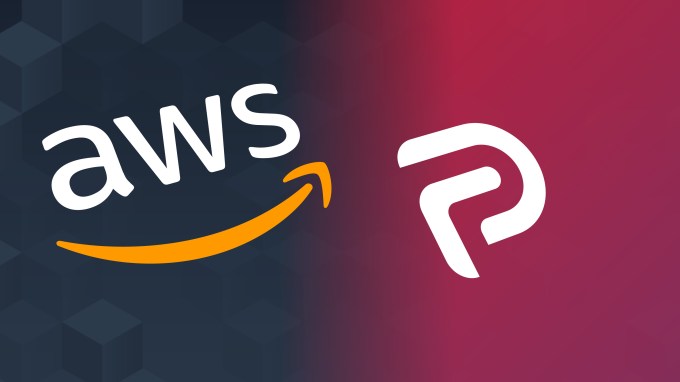
Logos for AWS (Amazon Web Services) and Parler. Image Credits: TechCrunch
U.S. District Judge Barbara Rothstein in Seattle this week ruled that Amazon won’t be required to restore access to web services to Parler. As you may recall, Parler sued Amazon for booting it from AWS’ infrastructure, effectively forcing it offline. Like Apple and Google before it, Amazon had decided that the calls for violence that were being spread on Parler violated its terms of service. It also said that Parler showed an “unwillingness and inability” to remove dangerous posts that called for the rape, torture and assassination of politicians, tech executives and many others, the AP reported.
Amazon’s decision shouldn’t have been a surprise for Parler. Amazon had reported 98 examples of Parler posts that incited violence over the past several weeks before its decision. It told Parler these were clear violations of the terms of service.
Parler’s lawsuit against Amazon, however, went on to claim breach of contract and even made antitrust allegations.
The judge shot down Parler’s claims that Amazon and Twitter were colluding over the decision to kick the app off AWS. Parler’s claims over breach of contract were denied, too, as the contract had never said Amazon had to give Parler 30 days to fix things. (Not to mention the fact that Parler breached the contract on its side, too.) It also said Parler had fallen short in demonstrating the need for an injunction to restore access to Amazon’s web services.
The ruling only blocks Parler from forcing Amazon to again host it as the lawsuit proceeds, but is not the final ruling in the overall case, which is continuing.
TikTok drives another pop song to No. 1 on Billboard charts, breaks Spotify’s record
@livbedumb♬ drivers license – Olivia Rodrigo
We already knew TikTok was playing a large role in influencing music charts and listening behavior. For example, Billboard last year noted how TikTok drove hits from Sony artists like Doja Cat (“Say So”) and 24kGoldn (“Mood”), and helped Sony discover new talent. Columbia also signed viral TikTok artists like Lil Nas X, Powfu, StaySolidRocky, Jawsh 685, Arizona Zervas and 24kGoldn. Meanwhile, Nielsen has said that no other app had helped break more songs in 2020 than TikTok.
This month, we’ve witnessed yet another example of this phenomenon. Olivia Rodrigo, the 17-year-old star of Disney+’s “High School Musical: The Musical: the Series” released her latest song, “Drivers License” on January 8. The pop ballad and breakup anthem is believed to be referencing the actress’ relationship with co-star Joshua Bassett, which gave the song even more appeal to fans.
Upon its release the song was heavily streamed by TikTok users, which helped make it an overnight sensation of sorts. According to a report by The WSJ, Billboard counted 76.1 million streams and 38,000 downloads in the U.S. during the week of its release. It also made a historic debut at No. 1 on the Hot 100, becoming the first smash hit of 2021.
On January 11, “Drivers License” broke Spotify’s record for most streams per day (for a non-holiday song) with 15.17 million global streams. On TikTok, meanwhile, the number of videos featuring the song and the views they received doubled every day, The WSJ said.
Charli D’Amelio’s dance to it on the app has now generated 5 million “Likes” across nearly 33 million views, as of the time of writing.
@charlidamelio♬ drivers license – Olivia Rodrigo
Of course, other TikTok hits have broken out in the past, too — even reaching No. 1 like “Blinding Lights” (The Weeknd) and “Mood” (24kGoldn). But the success of “Drivers License” may be in part due to the way it focuses on a subject that’s more relevant to TikTok’s young, teenage user base. It talks about first loves and being dumped for the other girl. And its title and opening refer to a time many adults have forgotten: the momentous day when you get your driver’s license. It’s highly relatable to the TikTok crowd who fully embraced it and made it a hit.
Weekly News
Platforms: Apple
- Apple stops signing iOS 12.5, making iOS 12.5.1 the only versions of iOS available to older devices.
- A report claims Apple’s iOS 15 update will cut support for devices with an A9 chip, like the iPhone 6, iPhone 6s Plus and the original iPhone SE.
- New analysis estimates Apple’s upcoming iOS privacy changes will cause a roughly 7% revenue hit for Facebook in Q2. The revenue hit will continue in following quarters and will be “material.”
Platforms: Google
- Google adds “trending” icons to the Play Store. New arrow icons appeared in the Top Charts tab, which indicate whether an app’s downloads are trending up or down, in terms of popularity. This could provide an early signal about those that may still be rising in the charts or beginning to fall out of favor, despite their current high position.
- Google appears to be working on a Restricted Networking mode for Android 12. The mode, discovered by XDA Developers digging in the Android Open Source Project, would disable network access for all third-party apps.
Gaming
- Goama (or Go Games) introduced a way for developers to integrate social games into their apps, which was showcased at CES. The company focuses on Asia and Latin America and has more than 15 partners, including GCash and Rappi, for digital payments and communications.
- Fortnite maker Epic Games is getting into movies. The animated feature film Gilgamesh will use Epic’s Unreal Engine technology to tell the story of the king-turned-deity. The movie is not an in-house project, but rather is financed through Epic’s $100M MegaGrants fund.
Augmented Reality
- Patents around Apple’s AR and VR efforts describe how a system could be identified in a way that’s similar to FaceID, then either permitted or denied the ability to change their appearance in the game.
- Pinterest launches AR try-on for eyeshadow in its mobile app using Lens technology and ModiFace data. The app already offered AR try-on for lipsticks.
Entertainment
- The CW app became the No. 1 app on the App Store this week, topping TikTok, Instagram and YouTube, thanks to CW’s season premieres of Batwoman, All American, Riverdale and Nancy Drew.
- Users of podcasting app Anchor, owned by Spotify, say the app isn’t bringing them any sponsorship opportunities, as promised, beyond those from Spotify and Anchor itself.
- YouTube launches hashtag landing pages on the web and in its mobile app. The pages are accessible when you click hashtags on YouTube, not via search, and weirdly rank the “best” videos through some inscrutable algorithm.
- Apple’s Podcasts app adds a new editorial feature, Apple Podcasts Spotlight, meant to increase podcast listening by showcasing the best podcasts as selected by Apple editors.
E-commerce
- WeChat facilitated 1.6 trillion yuan (close to $250 billion) in annual transactions through its “mini programs” in 2020. The figure is more than double that of 2019.
Fintech
- Douyin, the Chinese version of TikTok, launched an e-wallet, Douyin Pay. The wallet will supplement the existing payment options, Alipay and WeChat Pay, and will help to support the Douyin app’s growing e-commerce business.
- Neobank Monzo founder Tom Blomfield left the startup, saying he struggled during the pandemic. “I think [for] a lot of people in the world…going through a pandemic, going through lockdown and the isolation involved in that has an impact on people’s mental health,” he told TechCrunch.
- New estimates indicate about 50% of the iPhone user base (or 507 million users) now use Apple Pay.
- Samsung’s newest phones drop support for MST, which emulates a mag stripe at terminals that don’t support NFC.
Social
- Indian messaging app, StickerChat, owned by Hike, is shutting down. Founder Kavin Bharti Mittal said India will never have a homegrown messenger unless it bars Western companies from its market. Hike pivoted this month to virtual social apps, Vibe and Rush, which it believes have more potential.
- Instagram head Adam Mosseri, in a Verge podcast, said he’s not happy with Reels so far, and how he feels most people probably don’t understand the difference between Instagram video and IGTV. He says the social network needs to simplify and consolidate ideas.
- Facebook and Instagram improve their accessibility features. The apps’ AI-generated image captions now offer far more details about who or what is in the photos, thanks to improvements in image recognition systems.
- TikTok launches a Q&A feature that lets creators respond to fan questions using text or videos. The feature, rolled out to select creators with more than 10,000 followers, makes it easier to see all the questions in one place.
Health & Fitness
- Health and fitness app spending jumped 70% last year in Europe to record $544 million, a Sensor Tower report says. The year-over-year increase is far larger than 2019, when growth was just 37.2%. COVID-19 played a large role in this shift as people turned to fitness apps instead of gyms to stay in shape.
Government & Policy
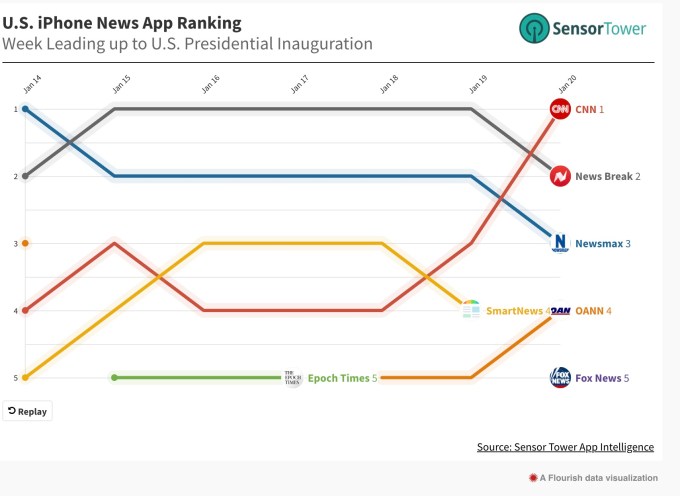
- Biden’s inauguration boosted installs of U.S. news apps up to 170%, Sensor Tower reported. CNN was the biggest mover, climbing 530 positions to reach No. 41 on the App Store, and up 170% in terms of downloads. News Break was the second highest, climbing 13 positions to No. 65. Right-wing outlet Newsmax climbed 43 spots to reach No. 108. In 2020, the top news apps were: News Break (23.7 million installs); SmartNews (9 million); CNN (5 million); and Fox News (4 million). This month, however, News Break saw 1.2 million installs, followed by Newsmax with about 863,000 installs, the report said.
- Ireland’s Data Protection Commission (DPC) sent a draft decision to fellow EU Data Protection Authorities over the WhatsApp-Facebook data sharing policy. This means a decision on the matter is coming closer to a resolution in terms of what standards of transparency is required by WhatsApp.
- German app developer Florian Mueller of FOSS Patents filed a complaint with the EU, U.S. DOJ and other antitrust watchdogs around the world over Apple and Google’s rejection of his COVID-related mobile game. Both stores had policies to only approve official COVID-19 apps from health authorities. Mueller renamed the game Viral Days and removed references to the novel coronavirus to get the app approved. However, he still feels the stores’ rules are holding back innovation.
Productivity
- Basecamp’s Hey, which famously fought back against Apple’s App Store rules over IAP last year, has launched a business-focused platform, Hey for Work, expected to be public in Q1. The app has more App Store ratings than rival Superhuman, a report found. Currently, Hey has a 4.7-star rating across 3.3K reviews; Superhuman has 3.9 rating across only 274 reviews.
Trends
- Baby boomers are increasingly using apps. Baby boomers/Gen Xers in the U.S. spent 30% more time year-over-year in their most used apps, App Annie reports. That’s a larger increase than either Millennials or Gen Z, at 18% and 16%, respectively.
Funding and M&A
- Curtsy, a clothing resale app for Gen Z women, raised an $11 million Series A led by Index Ventures. The app tackles some of the problems with online resale by sending shipping supplies and labels to sellers, and by making the marketplace accessible to new and casual sellers.
- Storytelling platform Wattpad acquired by South Korea’s Naver for $600 million. The reading apps whose stories have turned into book and Netflix hits will be incorporated into Naver’s publishing platform Webtoon.
- On-demand delivery app Glovo partnered with Swiss-based real estate firm, Stoneweg, which is investing €100 million in building and refurbishing real estate in key markets to build out Glovo’s network of “dark stores.”
- Pocket Casts app is up for sale. The podcast app was acquired nearly three years ago by a public radio consortium of top podcast producers (NPR, WNYC Studios, WBEZ Chicago and This American Life). The owners have now agreed to sell the app, which posted a net loss in 2020. (NPR’s share of the loss was over $800,000.)
- Travel app Maps.me raised $50 million in a round led by Alameda Research. The funding will go toward the launch of a multi-currency wallet. Cryptocurrency lender Genesis Capital and institutional cryptocurrency firm CMS Holdings also participated in the round, Coindesk reported.
- Bangalore-based hyperlocal delivery app Dunzo raised $40 million in a round that included investment from Google, Lightbox, Evolvence, Hana Financial Investment, LGT Lightstone Aspada and Alteria.
- London-based food delivery app Deliveroo raised $180 million in new funding from existing investors, led by Durable Capital Partners and Fidelity Management, valuing the business at more than $7 billion.
- Dating Group acquired Swiss startup Once, a dating app that sends one match per day, for $18 million.
Downloads
Bodyguard
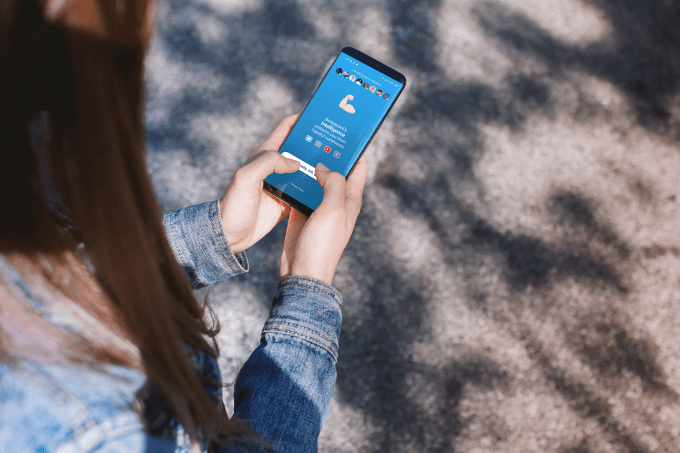
Image Credits: Bodyguard
A French content moderation app called Bodyguard, detailed here by TechCrunch, has brought its service to the English-speaking market. The app allows you to choose the level of content moderation you want to see on top social networks, like Twitter, YouTube, Instagram and Twitch. You can choose to hide toxic content across a range of categories, like insults, body shaming, moral harassment, sexual harassment, racism and homophobia and indicate whether the content is a low or high priority to block.
Beeper
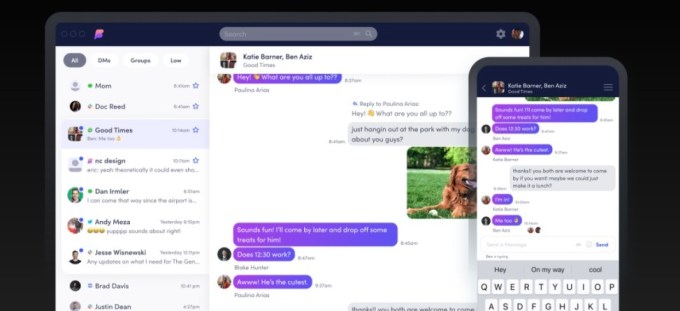
Image Credits: Beeper
Pebble’s founder and current YC Partner Eric Migicovsky has launched a new app, Beeper, that aims to centralize in one interface 15 different chat apps, including iMessage. The app relies on an open-source federated, encrypted messaging protocol called Matrix that uses “bridges” to connect to the various networks to move the messages. However, iMessage support is more wonky, as the company actually ships you an old iPhone to make the connection to the network. But this system allows you to access Beeper on non-Apple devices, the company says. The app is slowly onboarding new users due to initial demand. The app works across MacOS, Windows, Linux, iOS and Android and charges $10/mo for the service.
Powered by WPeMatico
Google and Snap in talks to invest in India’s ShareChat
ShareChat, an Indian social network that added Twitter as an investor in 2019, may soon receive the backing of two more American firms.
The Bangalore-based startup is in advanced stages of talks to raise money from Google and Snap, as well as several existing investors, including Twitter, three sources familiar with the matter told TechCrunch.
The new financing round — a Series E — is slated to be larger than $200 million, with Google alone financing more than $100 million of it, four sources said, requesting anonymity as the talks are private. The round values ShareChat at more than $1 billion, two of the sources said.
ShareChat, Google and Snap did not immediately respond to a request for comment. ShareChat has raised about $264 million to date and was valued at nearly $700 million last year.
The terms of the deal could change and the talks may not materialize into an investment, the sources cautioned. Local TV channel ET Now reported last year that Google was in talks to acquire ShareChat.
ShareChat’s marquee and eponymous app caters to users in 15 Indian languages and has a large following in small Indian cities and towns. Twitter and Snap, on the other hand, are struggling to gain users beyond urban cities in the world’s second-largest internet market. Both Twitter and Snapchat have about 50 million monthly active users in India, according to a popular mobile insight firm.
In an interview with TechCrunch last year, Ankush Sachdeva, co-founder and chief executive of ShareChat, said the app was growing “exponentially” and that users were spending, on average, more than 30 minutes on the app each day.
If the deal goes through, it would be the first investment from Snapchat’s parent company into an Indian startup. Google, on the other hand, has been on a spree of late. The Android-maker last month invested in DailyHunt and InMobi’s Glance, both of which operate short-video apps.
Like the two, ShareChat also operates a short-video app. Its app, called Moj, had amassed more than 80 million monthly active users as of September last year, the startup said at the time. Several of these short videos apps, as well as Times Internet’s MX TakaTak (operated by MX Player), have witnessed an accelerated growth in recent quarters thanks in part to New Delhi banning ByteDance’s TikTok and hundreds of other Chinese apps mid-last year.
Last year, Google announced that it plans to invest $10 billion in India over the course of five to seven years. Days later, the company invested $4.5 billion in Indian telecom giant Jio Platforms. Google and Facebook, which invested $5.7 billion in Jio Platforms last year, reach more than 400 million users in the country.
Google, Facebook, ShareChat, DailyHunt and Glance generate most of their revenue through ads. About 85% of the ad market in India is currently commanded by Facebook and Google, analysts at Bank of America wrote in a report to clients last year. “We estimate this market to be $10 billion by 2024 and see room for Facebook to increase its market-share by 4 percentage points in 4 years led by partnership with Jio. We estimate Facebook may have $4.7 billion revenues by 2024,” they wrote in the equity research report, obtained by TechCrunch.
Powered by WPeMatico
Twitter taps AWS for its latest foray into the public cloud
Twitter has a lot going on, and it’s not always easy to manage that kind of scale on your own. Today, Amazon announced that Twitter has signed a multi-year agreement with AWS to run its real-time timelines. It’s a major win for Amazon’s cloud arm.
While the companies have worked together in some capacity for over a decade, this marks the first time that Twitter is tapping AWS to help run its core timelines.
“This expansion onto AWS marks the first time that Twitter is leveraging the public cloud to scale their real-time service. Twitter will rely on the breadth and depth of AWS, including capabilities in compute, containers, storage and security, to reliably deliver the real-time service with the lowest latency, while continuing to develop and deploy new features to improve how people use Twitter,” the company explained in the announcement.
Parag Agrawal, chief technology officer at Twitter, sees this as a way to expand and improve the company’s real-time offerings by taking advantage of AWS’s network of data centers to deliver content closer to the user. “The collaboration with AWS will improve performance for people who use Twitter by enabling us to serve Tweets from data centers closer to our customers at the same time as we leverage the Arm-based architecture of AWS Graviton2 instances. In addition to helping us scale our infrastructure, this work with AWS enables us to ship features faster as we apply AWS’s diverse and growing portfolio of services,” Agrawal said in a statement.
It’s worth noting that Twitter also has a relationship with Google Cloud. In 2018, it announced it was moving its Hadoop clusters to GCP.
This announcement could be considered a case of the rich getting richer as AWS is the leader in the cloud infrastructure market by far, with around 33% market share. Microsoft is in second with around 18% and Google is in third with 9%, according to Synergy Research. In its most recent earnings report, Amazon reported $11.6 billion in AWS revenue, putting it on a run rate of over $46 billion.
Powered by WPeMatico
Turing nabs $32M more for an AI-based platform to source and manage engineers remotely
As remote work continues to solidify its place as a critical aspect of how businesses exist these days, a startup that has built a platform to help companies source and bring on one specific category of remote employees — engineers — is taking on some more funding to meet demand.
Turing — which has built an AI-based platform to help evaluate prospective, but far-flung, engineers, bring them together into remote teams, then manage them for the company — has picked up $32 million in a Series B round of funding led by WestBridge Capital. Its plan is as ambitious as the world it is addressing is wide: an AI platform to help define the future of how companies source IT talent to grow.
“They have a ton of experience in investing in global IT services, companies like Cognizant and GlobalLogic,” said co-founder and CEO Jonathan Siddharth of its lead investor in an interview the other day. “We see Turing as the next iteration of that model. Once software ate the IT services industry, what would Accenture look like?”
It currently has a database of some 180,000 engineers covering around 100 or so engineering skills, including React, Node, Python, Agular, Swift, Android, Java, Rails, Golang, PHP, Vue, DevOps, machine learning, data engineering and more.
In addition to WestBridge, other investors in this round included Foundation Capital, Altair Capital, Mindset Ventures, Frontier Ventures and Gaingels. There is also a very long list of high-profile angels participating, underscoring the network that the founders themselves have amassed. It includes unnamed executives from Google, Facebook, Amazon, Twitter, Microsoft, Snap and other companies, as well as Adam D’Angelo (Facebook’s first CTO and CEO at Quora), Gokul Rajaram, Cyan Banister and Scott Banister, and Beerud Sheth (the founder of Upwork), among many others (I’ll run the full list below).
Turing is not disclosing its valuation. But as a measure of its momentum, it was only in August that the company raised a seed round of $14 million, led by Foundation. Siddharth said that the growth has been strong enough in the interim that the valuations it was getting and the level of interest compelled the company to skip a Series A altogether and go straight for its Series B.
The company now has signed up to its platform 180,000 developers from across 10,000 cities (compared to 150,000 developers back in August). Some 50,000 of them have gone through automated vetting on the Turing platform, and the task will now be to bring on more companies to tap into that trove of talent.
Or, “We are demand-constrained,” which is how Siddharth describes it. At the same time, it’s been growing revenues and growing its customer base, jumping from revenues of $9.5 million in October to $12 million in November, increasing 17x since first becoming generally available 14 months ago. Current customers include VillageMD, Plume, Lambda School, Ohi Tech, Proxy and Carta Healthcare.
Remote work = immediate opportunity
A lot of people talk about remote work today in the context of people no longer able to go into their offices as part of the effort to curtail the spread of COVID-19. But in reality, another form of it has been in existence for decades.
Offshoring and outsourcing by way of help from third parties — such as Accenture and other systems integrators — are two ways that companies have been scaling and operating, paying sums to those third parties to run certain functions or build out specific areas instead of shouldering the operating costs of employing, upsizing and sometimes downsizing that labor force itself.
Turing is essentially tapping into both concepts. On one hand, it has built a new way to source and run teams of people, specifically engineers, on behalf of others. On the other, it’s using the opportunity that has presented itself in the last year to open up the minds of engineering managers and others to consider the idea of bringing on people they might have previously insisted work in their offices, to now work for them remotely, and still be effective.
Siddarth and co-founder Vijay Krishnan (who is the CTO) know the other side of the coin all too well. They are both from India, and both relocated to the Valley first for school (post-graduate degrees at Stanford) and then work at a time when moving to the Valley was effectively the only option for ambitious people like them to get employed by large, global tech companies, or build startups — effectively what could become large, global tech companies.
“Talent is universal, but opportunities are not,” Siddarth said to me earlier this year when describing the state of the situation.
A previous startup co-founded by the pair — content discovery app Rover — highlighted to them a gap in the market. They built the startup around a remote and distributed team of engineers, which helped them keep costs down while still recruiting top talent. Meanwhile, rivals were building teams in the Valley. “All our competitors in Palo Alto and the wider area were burning through tons of cash, and it’s only worse now. Salaries have skyrocketed,” he said.
After Rover was acquired by Revcontent, a recommendation platform that competes against the likes of Taboola and Outbrain, they decided to turn their attention to seeing if they could build a startup based on how they had, basically, built their own previous startup.
There are a number of companies that have been tapping into the different aspects of the remote work opportunity, as it pertains to sourcing talent and how to manage it.
They include the likes of Remote (raised $35 million in November), Deel ($30 million raised in September), Papaya Global ($40 million also in September), Lattice ($45 million in July) and Factorial ($16 million in April), among others.
What’s interesting about Turing is how it’s trying to address and provide services for the different stages you go through when finding new talent. It starts with an AI platform to source and vet candidates. That then moves into matching people with opportunities, and onboarding those engineers. Then, Turing helps manage their work and productivity in a secure fashion, and also provides guidance on the best way to manage that worker in the most compliant way, be it as a contractor or potentially as a full-time remote employee.
The company is not freemium, as such, but gives people two weeks to trial people before committing to a project. So unlike an Accenture, Turing itself tries to build in some elasticity into its own product, not unlike the kind of elasticity that it promises its customers.
It all sounds like a great idea now, but interestingly, it was only after remote work really became the norm around March/April of this year that the idea really started to pick up traction.
“It’s amazing what COVID has done. It’s led to a huge boom for Turing,” said Sumir Chadha, managing director for WestBridge Capital, in an interview. For those who are building out tech teams, he added, there is now “No need for to find engineers and match them with customers. All of that is done in the cloud.”
“Turing has a very interesting business model, which today is especially relevant,” said Igor Ryabenkiy, managing partner at Altair Capital, in a statement. “Access to the best talent worldwide and keeping it well-managed and cost-effective make the offering attractive for many corporations. The energy of the founding team provides fast growth for the company, which will be even more accelerated after the B-round.”
PS. I said I’d list the full, longer list of investors in this round. In these COVID times, this is likely the biggest kind of party you’ll see for a while. In addition to those listed above, it included [deep breath] Founders Fund, Chapter One Ventures (Jeff Morris Jr.), Plug and Play Tech Ventures (Saeed Amidi), UpHonest Capital (Wei Guo, Ellen Ma), Ideas & Capital (Xavier Ponce de León), 500 Startups Vietnam (Binh Tran and Eddie Thai), Canvas Ventures (Gary Little), B Capital (Karen Appleton Page, Kabir Narang), Peak State Ventures (Bryan Ciambella, Seva Zakharov), Stanford StartX Fund, Amino Capital, Spike Ventures, Visary Capital (Faizan Khan), Brainstorm Ventures (Ariel Jaduszliwer), Dmitry Chernyak, Lorenzo Thione, Shariq Rizvi, Siqi Chen, Yi Ding, Sunil Rajaraman, Parakram Khandpur, Kintan Brahmbhatt, Cameron Drummond, Kevin Moore, Sundeep Ahuja, Auren Hoffman, Greg Back, Sean Foote, Kelly Graziadei, Bobby Balachandran, Ajith Samuel, Aakash Dhuna, Adam Canady, Steffen Nauman, Sybille Nauman, Eric Cohen, Vlad V, Marat Kichikov, Piyush Prahladka, Manas Joglekar, Vladimir Khristenko, Tim and Melinda Thompson, Alexandr Katalov, Joseph and Lea Anne Ng, Jed Ng, Eric Bunting, Rafael Carmona, Jorge Carmona, Viacheslav Turpanov, James Borow, Ray Carroll, Suzanne Fletcher, Denis Beloglazov, Tigran Nazaretian, Andrew Kamotskiy, Ilya Poz, Natalia Shkirtil, Ludmila Khrapchenko, Ustavshchikov Sergey, Maxim Matcin and Peggy Ferrell.
Powered by WPeMatico
Daily Crunch: Pakistan un-bans TikTok
TikTok returns to Pakistan, Apple launches a music-focused streaming station and SpaceX launches more Starlink satellites. This is your Daily Crunch for October 19, 2020.
The big story: Pakistan un-bans TikTok
The Pakistan Telecommunication Authority blocked the video app 11 days ago, over what it described as “immoral,” “obscene” and “vulgar” videos. The authority said today that it’s lifting the ban after negotiating with TikTok management.
“The restoration of TikTok is strictly subject to the condition that the platform will not be used for the spread of vulgarity/indecent content & societal values will not be abused,” it continued.
This isn’t the first time this year the country tried to crack down on digital content. Pakistan announced new internet censorship rules this year, but rescinded them after Facebook, Google and Twitter threatened to leave the country.
The tech giants
Apple launches a US-only music video station, Apple Music TV — The new music video station offers a free, 24-hour live stream of popular music videos and other music content.
Google Cloud launches Lending DocAI, its first dedicated mortgage industry tool — The tool is meant to help mortgage companies speed up the process of evaluating a borrower’s income and asset documents.
Facebook introduces a new Messenger API with support for Instagram — The update means businesses will be able to integrate Instagram messaging into the applications and workflows they’re already using in-house to manage their Facebook conversations.
Startups, funding and venture capital
SpaceX successfully launches 60 more Starlink satellites, bringing total delivered to orbit to more than 800 — That makes 835 Starlink satellites launched thus far, though not all of those are operational.
Singapore tech-based real estate agency Propseller raises $1.2M seed round — Propseller combines a tech platform with in-house agents to close transactions more quickly.
Ready Set Raise, an accelerator for women built by women, announces third class — Ready Set Raise has changed its programming to be more focused on a “realistic fundraising process” vetted by hundreds of women.
Advice and analysis for Extra Crunch
Are VCs cutting checks in the closing days of the 2020 election? — Several investors told TechCrunch they were split about how they’re making these decisions.
Disney+ UX teardown: Wins, fails and fixes — With the help of Built for Mars founder and UX expert Peter Ramsey, we highlight some of the things Disney+ gets right and things that should be fixed.
Late-stage deals made Q3 2020 a standout VC quarter for US-based startups — Investors backed a record 88 megarounds of $100 million or more.
(Reminder: Extra Crunch is our subscription membership program, which aims to democratize information about startups. You can sign up here.)
Everything else
US charges Russian hackers blamed for Ukraine power outages and the NotPetya ransomware attack — Prosecutors said the group of hackers, who work for the Russian GRU, are behind the “most disruptive and destructive series of computer attacks ever attributed to a single group.”
Stitcher’s podcasts arrive on Pandora with acquisition’s completion — SiriusXM today completed its previously announced $325 million acquisition of podcast platform Stitcher from E.W. Scripps, and has now launched Stitcher’s podcasts on Pandora.
Original Content podcast: It’s hard to resist the silliness of ‘Emily in Paris’ — The show’s Paris is a fantasy, but it’s a fantasy that we’re happy to visit.
The Daily Crunch is TechCrunch’s roundup of our biggest and most important stories. If you’d like to get this delivered to your inbox every day at around 3pm Pacific, you can subscribe here.
Powered by WPeMatico

